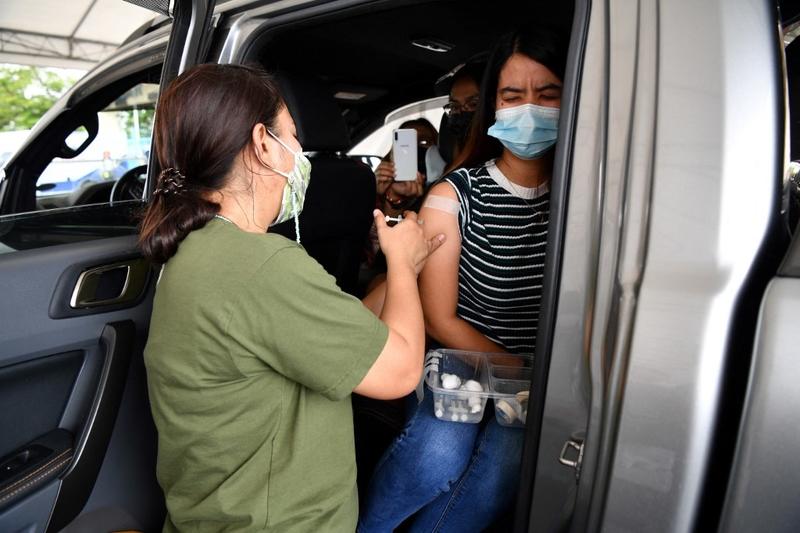 A health worker administers a dose of the BioNtech Pfizer Covid-19 vaccine to a resident at a drive-through vaccination center in Manila City suburban Manila on July 31, 2021. (PHOTO / AFP)
A health worker administers a dose of the BioNtech Pfizer Covid-19 vaccine to a resident at a drive-through vaccination center in Manila City suburban Manila on July 31, 2021. (PHOTO / AFP)
The Philippines is in a race against time to stockpile on COVID-19 vaccines as it contends with a rise in cases of the highly-transmissible Delta coronavirus variant.
The country, which was already battling the second worst virus outbreak in Southeast Asia, reported its first locally transmitted cases of Delta infections in mid-July, and confirmed more such cases in the following two weeks. As of Aug 2, the country has detected 165 cases of the Delta variant, according to the Philippines’ Department of Health.
The government has ordered 164 million doses of vaccines, over 34 million of which have been delivered as of Aug 2. Chinese vaccines, which helped launched the Philippines’ inoculation program in March, account for about 15 percent of the total Philippine vaccine procurement.
But as President Rodrigo Duterte admitted in an Aug 2 briefing, vaccine supply remains insufficient.
Duterte said most vaccines so far have been administered to the residents of the capital region of Metro Manila given its huge population and the prevalence of local transmission.
The Philippines reported its first locally transmitted cases of Delta infections in mid-July, and confirmed more such cases in the following two weeks
ALSO READ: Philippines says vaccine orders enough to hit 2021 goal
A COVID-19 hotspot, Metro Manila is home to over 16 million Filipinos. The Philippines has over 1.5 million COVID-19 cases, about 13,000 of which are in the capital region.
Of the total number of vaccines delivered, 20.8 million doses have been administered, according to Carlito Galvez Jr, the chief implementer of the National Task Force Against COVID-19, or NTFAC. He said a total of 9.1 million Filipinos are fully vaccinated, equivalent to roughly 13 percent of the over 70 million people that the government is aiming to vaccinate by year-end.
Lulu Bravo, executive director of the Philippine Foundation for Vaccination and chairperson of the National Adverse Events Following Immunization Committee, said more Filipinos are now willing to get vaccinated as they have seen how the pandemic has claimed thousands of lives.
“They’re seeing that lot of people are dying,” Bravo said, noting that it is eventually this fear of contracting the virus that neutralized the anti-vaccine sentiment that was prevalent in Philippines during the early phase of the pandemic.
Bravo recalled how the health scare brought about by a controversy surrounding dengue fever vaccine Dengvaxia four years ago has reduced vaccine confidence among Filipinos.
In 2016, Philippines launched a vaccination campaign using Dengvaxia as a way to protect children from dengue. But the program was suspended in 2017 after Sanofi, the French company that developed Dengvaxia, advised the government that the vaccine could worsen the disease in people who had not previously been exposed to the infection. This has led to several congressional inquiries, the filing of criminal charges and a widespread fear of vaccinations.
But people’s mindset has begun to change as the pandemic worsens. A survey conducted by Manila-based pollster Pulse Asia Research in June revealed that 43 percent, out of 2,400 respondents, were willing to receive their COVID-19 shot. This was significantly higher compared to the result of a previous survey in February which showed that only 16 percent wanted to get vaccinated.
There is still some vaccine hesitancy among senior citizens, Galvez of NTFAC said, noting that the pace of vaccination for this priority sector barely moved in the past few weeks. Only 2.8 million elderly Filipinos have been vaccinated as of Aug 1.
Nina Castillo-Carandang, a professor at the University of the Philippines’ College of Medicine, said it is the issue of accessibility, not poor vaccine confidence, which is keeping most senior citizens from getting immunized.
For example, it is difficult for seniors to book vaccination appointments as this is usually done online, which can be a challenge for senior citizens. Castillo-Carandang said that owing to health problems, it is also hard for elderly people to go to vaccination centers unless they can find someone to accompany them.
She said that for the general population, inadequate supply is hampering the vaccinations pace.
Noting that vaccination is a human right, Castillo-Carandang expressed concern over moves by some industrialized countries to stockpile vaccines beyond their needs, which have led to tight global supplies and made it more difficult for developing countries to access the jabs.
Gene Nisperos, board member of the Manila-based non-profit group Community Medicine Development Foundation, said the inadequate vaccine supply in the Philippines is “a symptom of a bigger problem, which is the poor handling of pandemic response”.
READ MORE: Virus: Inoculations to start as vaccines arrive in Australia, NZ
He questioned the government’s imposition of lockdown measures in Metro Manila from August 6 to 20 to curb the spread of the Delta variant.
Nisperos said lockdowns were necessary during the early months of the pandemic as everyone was blindsided by the COVID-19 outbreak and authorities need more time to plan measures against the pandemic. But lockdown measures cannot be “a mainstay response”, he said.
Rather than lockdowns or focusing all efforts on inoculations, the government needs to improve testing, contact tracing and bio surveillance, Nisperos said. This is especially crucial as the Delta variant is spreading locally.


